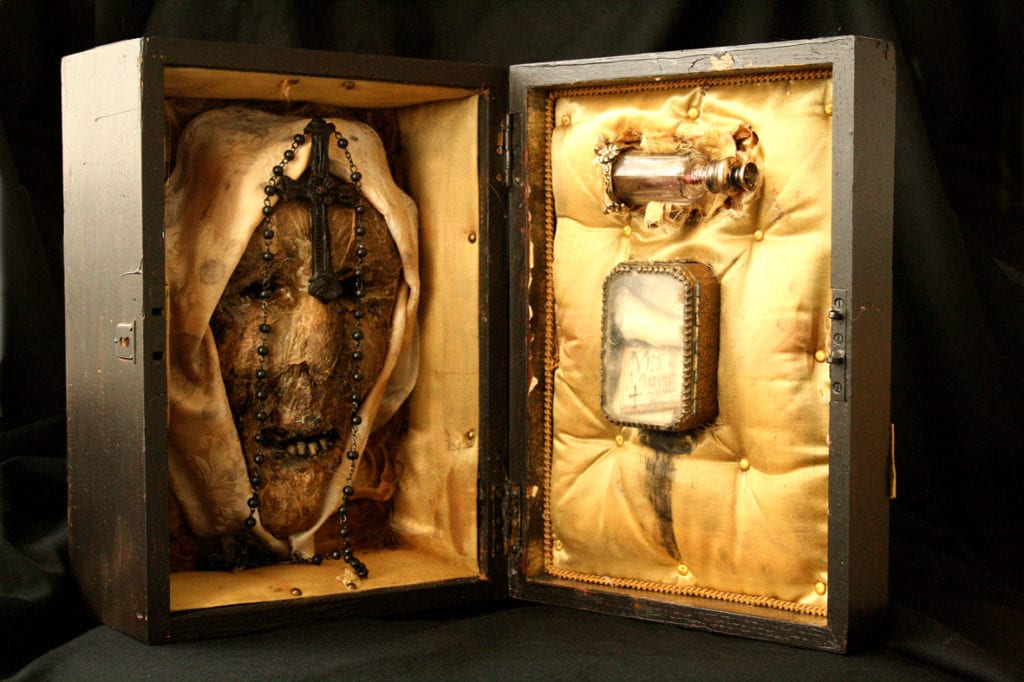 Technology
Technology  Technology
Technology  Weird Stuff
Weird Stuff 10 Wild Facts About Taxidermy That You Probably Didn’t Know
 Travel
Travel 10 Beautiful Travel Destinations (That Will Kill You)
 Miscellaneous
Miscellaneous 10 Modern Marriage Rituals Born from Corporate Branding
 Weird Stuff
Weird Stuff Ten Bizarre Visions of 2026 from Fiction
 Weird Stuff
Weird Stuff The 10 Unluckiest Days from Around the World
 Food
Food 10 Modern Delicacies That Started as Poverty Rations
 Movies and TV
Movies and TV 10 Shared TV Universes You’ve Likely Forgotten About
 Weird Stuff
Weird Stuff 10 of History’s Greatest Pranks & Hoaxes
 Miscellaneous
Miscellaneous 10 LEGO Facts That Will Toy with Your Mind
 Technology
Technology 10 Stopgap Technologies That Became Industry Standards
 Weird Stuff
Weird Stuff 10 Wild Facts About Taxidermy That You Probably Didn’t Know
 Travel
Travel 10 Beautiful Travel Destinations (That Will Kill You)
Who's Behind Listverse?

Jamie Frater
Head Editor
Jamie founded Listverse due to an insatiable desire to share fascinating, obscure, and bizarre facts. He has been a guest speaker on numerous national radio and television stations and is a five time published author.
More About Us Miscellaneous
Miscellaneous 10 Modern Marriage Rituals Born from Corporate Branding
 Weird Stuff
Weird Stuff Ten Bizarre Visions of 2026 from Fiction
 Weird Stuff
Weird Stuff The 10 Unluckiest Days from Around the World
 Food
Food 10 Modern Delicacies That Started as Poverty Rations
 Movies and TV
Movies and TV 10 Shared TV Universes You’ve Likely Forgotten About
 Weird Stuff
Weird Stuff 10 of History’s Greatest Pranks & Hoaxes
 Miscellaneous
Miscellaneous 10 LEGO Facts That Will Toy with Your Mind
Top 10 Women (Not Called Mary) Who Had A Virgin Birth
Many invertebrate animals reproduce by means of parthenogenesis, the spontaneous splitting of the female egg without assistance from male sperm. In humans, however, procreation is usually considered to be a two-player game.
Throughout history, however, there have been isolated claims of human parthenogenesis. Women have claimed to have had unassisted births through the power of prayer, thought or particularly vivid dreams.
Or, possibly, someone isn’t telling the truth.
10 Self-Proclaimed Holy Men Whose Miracles Went Horribly Wrong
10 0.5% of Pregnant Americans

OK, well, some of them may be called Mary, but a long-term study of the reproductive health of American women, uncovered the fact that one woman in 200 claimed to have given birth without ever having had sex. 7870 women, aged 15 to 28 were studied, of whom 45 claimed to have had a pregnancy “unrelated to the use of assisted reproductive technology.”
Assisted technology, in this instance, means the assistance of a sperm, as well as more medically assisted measures such as IVF, in order to achieve reproduction. Researchers found that the women who claimed to have conceived without assistance, shared some common characteristics.
31% had signed a chastity pledge (compared with 15% of non-virgin pregnant women)
28% felt they didn’t have enough information about sex and contraception (compared with 5% of sexually active mothers)
And, perhaps least surprising of all, 100% of the virgin mothers reported that their parents had never talked to them about sex and birth control.[1]
9 The Civil War Bullet Baby

The American Civil War was marked by fierce fighting, which often led to life-changing injuries. That was certainly the case for one woman. She lived with her mother and sister in a fine home, only a few hundred yards from the battlefield.
The three women often stood on their porch, waiting for a pause in the fighting, so that they could do their bit to tend the wounded. A doctor who rode with the regiment reported seeing a young man shot near the ladies’ house. He watched as the man fell, and heard a scream from inside the house at the same time.
The trajectory of the bullet passed through the soldier’s scrotum, taking with it part of his testicle. The doctor dressed his wounds as best he could, and when he was almost finished, the lady of the house ran to fetch the doctor, because the bullet, after exiting the soldier, had, it seems, continued on its path and hit her daughter.
So far, so plausible.
A small piece of gunshot had penetrated her ‘abdominal cavity’. The doctor had time to give her only a cursory examination, before hurrying back to the battle.
However, he was able to return a few months later, and was pleased to see that she seemed to have made a full recovery. He noticed however, her abdomen had become ‘enormously enlarged, so much so as to resemble pregnancy at the seventh or eighth month.’
Uh-huh
(Not quite) 40 weeks after sustaining her injury, the young woman gave birth to a boy, to the amazement of the doctor, the family and, possibly, the girl. The doctor even asserted that, before the delivery he had observed the young lady’s hymen to be intact.
Not only that, but the new-born son was observed to have “something wrong about the genitals.” On examination, the baby was said to have absorbed a fragment of the gunshot in his scrotum, from, presumably, the scrotum of his father.
Right.
The doctor wrote up his findings, but seems to have had a change of heart later.
Possibly his colleagues were rather less trusting. One or two may even have sniggered.
He later maintained that he was only repeating what he had been told, and added that “accidents may happen in the best regulated families.”[2]
8 The Chinese Virgin

In 2019, a woman who had ‘never had a boyfriend’, gave birth in Guiyang, China. She was brought into hospital with abdominal pains, and, when doctors diagnosed the cause as labor pains, refused to accept the diagnosis, because she was a virgin.
She had not noticed that she was pregnant, being over-weight, as this hid some of the normal bodily changes of pregnant women.
She was said to be ‘shocked’.
When the doctor asked if she might, possibly, have conceived while drunk, she said she was allergic to alcohol and had never touched it. Before she gave permission for a Cesarean section, she insisted that doctors carry out a virginity test, which they did, although the results were never made public.[3]
7 The Indian Virgin

Revati Borawekar from Ahmednagar, India, suffers from a medical condition which prevents her from having sex. The condition, which causes her vagina to clamp shut when touched, would have stopped her from ever conceiving naturally.
Despite trying a number of self-help measures, she and he husband, turned to doctors for help when the couple decided they wanted a child. The conception had to be carried out under general anesthetic, but she was able to deliver the child naturally, with the help of an epidural.
Borawekar, and her husband, are now hoping that the delivery of the baby has now paved the way for them to have a normal sex-life. Speaking about her hopes for the future, she said, “I’ll always remind myself that if I can push a six-pound baby with a head circumference of 33 cm out my vagina, I can easily take in a penis with much lesser circumference inside of me.”
With an epidural.[4]
6 The French Noblewoman

In 1637, Madeleine D’Auvermont gave birth to a healthy baby boy. Which was a bit awkward, since her husband had been away from home for 4 years.
The birth caused quite the scandal in 17th century France. Madeleine’s husband was a nobleman, and at stake was her new-born son’s right to inherit his father’s title and land, as well, of course, as Madeleine’s reputation, and in all likelihood, her life.
She was brought before a court and tried for adultery. In her defense, she claimed that she thought about her husband at night, often having ‘vivid’ dreams about him. She claimed that the child had been conceived ‘through the power of imagination’.
Medical and theological experts were brought in to testify, and both accepted that this was possible, as long as she imagined really really hard. The court found in her favor and her son was declared to be the legitimate heir to his father’s estate.
It is not recorded what the father said.[5]
5 The First (kind of) Case of Human Parthenogenesis

In 1995, British geneticists reported a case of ‘partial parthenogenesis’, the first ever discovered by scientists. True parthenogenesis requires a self-fertilizing female egg. Although mammals can sometimes have eggs which spontaneously divide, they usually develop only so far as to become a benign tumor, called an ovarian teratoma.
However, when geneticists studied the blood of a 3-year-old boy they discovered that his cells contained only X-X chromosomes, instead of the expected X-Y chromosomes that males usually carry. Despite their most sensitive equipment, they were unable to detect any Y chromosomes in his blood.
The boys skin, however, contained typical male X-Y chromosomes, which led researchers to examine his DNA more closely. Normally a child will receive X chromosomes from both the mother and the father, but his X chromosomes had come exclusively from his mother. Researcher’s believe that the child’s development started when an unfertilized egg self-activated and began to divide (true parthenogenesis), and it was only later fertilized by a sperm, which allowed it to develop into a full-term baby.
While the child, as a whole, had a father, his blood, it seems, did not.[6]
4 The Italian Nun

In 2015, an Italian nun, who had been living in a closed order for 2 years, developed ‘stomach cramps’ and collapsed at the convent in San Severino. An ambulance was called, and the 31-year-old nun was rushed into the hospital.
When doctors told her that she was in labor, she is reported to have said, ‘I can’t be. I’m a nun.’
Despite this, she gave birth to a healthy boy, who she named Francis, in honor of the Pope. Her fellow sisters were said to be ‘surprised’ by the news that their sister had become a mother. The local priest, in a display of underwhelming support, said “I guess she’s telling the truth when she says she arrived at the hospital unaware of the pregnancy.”
It was later decided that she would not be returning to the convent, but would live in the community and raise her child.[7]
3 The Serpent Loving Queen

The conception of Alexander the Great is as strange as any Greek Myth. The night before her marriage was to be consummated, Olympias dreamt that she had been hit by a thunderbolt, which then started a great fire around her. Her husband, Philip, meanwhile, dreamt (separately) that he had sealed his wife’s ‘body’ up with sealing wax, into which he pressed a seal in the shape of a lion.
OK. Nothing Freudian about that.
Some mystics interpreted Philip’s dream as a warning that he should ‘look narrowly to his wife’, but others, that it meant that the Queen was pregnant and would bear him a son with the courage of a lion.
Philip had once discovered a snake sleeping in his wife’s bed, which, he said, ‘abated’ his passion for her, as he feared she was some kind of witch, and he decided it was best to leave well alone. Perhaps it was her husband’s neglect which explained Olympias’ disturbed sleep.
Or it could have been the snake.
Whatever the reason, Philip wouldn’t go near his wife, having mentally sealed all her passageways, and, when he consulted the Oracle at Delphi, he was told that he would one day lose the eye with which he was going to peep through a keyhole at his wife ‘in the company of’ a god, disguised as a serpent.
Uh-huh.
Olympias gave birth to Alexander on the same day that the Temple of Artemis was burnt down, which was considered an omen. And not a good one. In fact, the soothsayers, of which there seemed to be many, “ran about the town, beating their faces, and crying that this day had brought forth something that would prove fatal and destructive to all Asia.”
Which is quite the burden to put on a baby.[8]
2 The IVF virgins

Sex is no longer a pre-requisite for pregnancy, it seems. Since 1978, and the birth of Louise Brown, many couples have successfully had children through IVF, and the process is no longer limited only to couples who are unable to have children naturally. And while many single women opt to try IVF to help them conceive, up until recently, this has usually been after conventional conception has failed.
In 2016, however, it was reported that 25 British women who had never had sex, were given IVF and went on to have ‘virgin births’. The women, who all identified as heterosexual, and who were all in their 20s, decided that they were ready to be a parent, but were not ready to have sex.
Some of the women identified as having a psychosexual condition, while others said they had either not met the right partner or did not want a partner at all.[9]
1 Sister Josephine Rosenthal

When Sister Josephine Rosenthal fell pregnant in 1742, her fellow nuns at her isolated convent were flummoxed. Their confusion grew when a medical examination declared that, not only was she still a virgin, she was also “unable to be with child”, although, given her condition, that diagnosis seemed oxymoronic (and possibly not even oxy).
When she was around 6 months pregnant, she was examined again, and was positively declared to have undergone an ‘immaculate conception’. Josephine died shortly after giving birth and the baby, named Maria, was cared for by the nuns, who believed that she had been sent by God.
Perhaps not surprisingly, Maria herself became a nun and led her own congregation, despite a large amount of skepticism and even outright condemnation from the church hierarchy. She wrote a number of papers about the condemnation of the female within the church, which can, perhaps, be seen as early feminist texts. Unfortunately most of her writings have been lost, and her order no longer exists. However, a few relics of Maria Rosenthal do remain, including some body-parts, and a vial of her blood, which are kept in a reliquary for veneration.
The blood is supposed to have special significance since, it is claimed, it proves that both Maria and her mother, Josephine, had ‘rare genetic traits’, and were hermaphrodites who were able to spontaneously self-impregnate and give birth ‘without taint of sin’.
To date, however, no genetic researchers have been given permission to study Maria Rosenthal’s miracle blood, which had been so conveniently placed in the reliquary for them.
Next to her face.[10]
Top 10 People Who Give Islam a Bad Name







